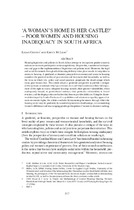'A woman's home is her castle?' - poor women and housing inadequacy in South Africa
Abstract
Housing legislation and policies in South Africa attempt to incorporate gender concerns and ensure women's participation in housing delivery. Despite this, a number of inadequacies and gaps in the implementation of legislation and policies exist. Moreover, the legal and social framework through which housing delivery takes place results in inequities in access to housing. A gendered, or feminist, perspective on women and access to housing considers the practical reality of poor women and women-headed households, as well as the ways in which law, policy and social practices perpetuate the disadvantage which many poor women face. This article adopts a gendered perspective to provide a critique of the systemic constraints which poor women face and which undermine their full enjoyment of the right to access adequate housing: namely, their greater vulnerability, when inadequately housed, to gender-based violence; their particular vulnerability to forced eviction; and the disproportionate burden they bear to provide childcare. Using the framework developed by Sandra Fredman of a capabilities and substantive equality approach to socio-economic rights, the article concludes by examining the means through which the housing sector may be gendered, by considering women's disadvantage, accommodating women's difference and encouraging greater participation of women in decision-making.

